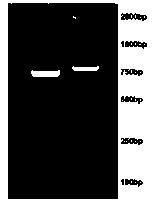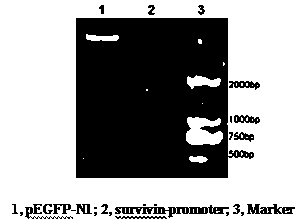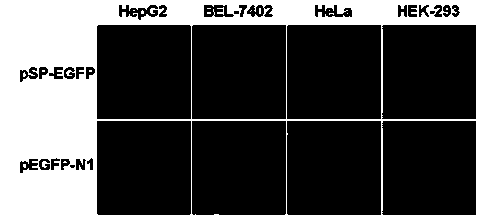Construction of recombinant adenovirus vector for regulating and controlling cytosine deaminase (CD) gene by Survivin promoter and application thereof
A recombinant adenovirus and promoter technology, applied in the field of recombinant adenovirus, can solve the problems of normal tissue damage, ideal curative effect in tumor patients, etc., and achieve the effect of enhancing specificity
- Summary
- Abstract
- Description
- Claims
- Application Information
AI Technical Summary
Problems solved by technology
Method used
Image
Examples
Embodiment 1
[0039] Example 1: Amplification of the Survivin promoter
[0040] Primers were designed according to the sequence of the survivin promoter in Genebank, and the restriction sites AseI and NheI were introduced into the primers respectively,
[0041] Upstream primer SEQ NO:3:
[0042] GGCATTAATTCTAGATCCCCAGCTCCCTTGTCTTCTTAT,
[0043] Downstream primer SEQ NO:4:
[0044] AATGCTAGCAGTAGAGGCGGGGCGGCGC.
[0045] Use this primer to perform PCR amplification using the genomic DNA of BEL-7402 as a template: pre-denaturation at 94°C for 5 minutes; 40s at 94°C, 50s at 55°C, 50s at 72°C, 35 cycles of amplification and extension at 72°C for 5 minutes, and the PCR product was subjected to agar agar Glycogel electrophoresis analysis, get a specific band (such as figure 1 ), the size of the fragment is about 700bp, which is in line with the expected size. After the gel recovery of the fragment, it is connected to the pGEM-T vector to construct a recombinant plasmid pT-SP. After transf...
Embodiment 2
[0046] Example 2: Construction and expression activity detection of green fluorescent protein (GFP) reporter plasmid regulated by survivin promoter
[0047] Digest pT-SP and pEGFP-N1 plasmids with NheI and AseI restriction endonucleases, and recover the excised survivin promoter and the pEGFP-N1 plasmid with excised CMV promoter respectively, and detect the concentration of the two by electrophoresis after recovery ( figure 2 ), and then transform E. coli after overnight ligation, pick clones for colony PCR detection, and confirm positive clones to extract plasmids for transfection.
[0048] Use Lipofectamine2000 to transfect pSP-EGFP plasmid into different cells, including human liver cancer cell line BEL-7402, human liver cancer cell line HepG2, human cervical cancer cell line HeLa and non-tumor cell line HEK-293. At the same time, pEGFP-N1 was used as a positive control, and fluorescence observation was performed 48 hours after transfection. It can be seen that the expre...
Embodiment 3
[0049] Embodiment 3: the cloning of yeast cell Cytosine deaminase (CD) gene
[0050] Primers were designed according to the sequence of Saccharomyces cerevisiae CD gene in Genebank, and restriction sites SacI and SalI were introduced into the primers respectively,
[0051] Upstream primer SEQ NO:5: atagagctcacgATGGTGACAGGGGGAATGGC,
[0052] Downstream primer SEQ NO: 6: cgcgtcgacCTACTCACCAATATCTTCAAACC.
[0053] Use this primer to carry out PCR amplification using the genomic DNA of Saccharomyces cerevisiae cells as a template: pre-denature at 94°C for 10 minutes; Glycogel electrophoresis analysis, get a specific band (such as Figure 4 ), the size of the fragment is about 500bp, which is in line with the expected size. After the fragment is recovered by glue, it is connected to the pGEM-T vector to construct a recombinant plasmid pT-CD. After transforming E. coli DH5α, positive clones are picked and sent to the company for sequencing analysis , the result is shown in SEQ NO...
PUM
 Login to View More
Login to View More Abstract
Description
Claims
Application Information
 Login to View More
Login to View More - R&D
- Intellectual Property
- Life Sciences
- Materials
- Tech Scout
- Unparalleled Data Quality
- Higher Quality Content
- 60% Fewer Hallucinations
Browse by: Latest US Patents, China's latest patents, Technical Efficacy Thesaurus, Application Domain, Technology Topic, Popular Technical Reports.
© 2025 PatSnap. All rights reserved.Legal|Privacy policy|Modern Slavery Act Transparency Statement|Sitemap|About US| Contact US: help@patsnap.com



